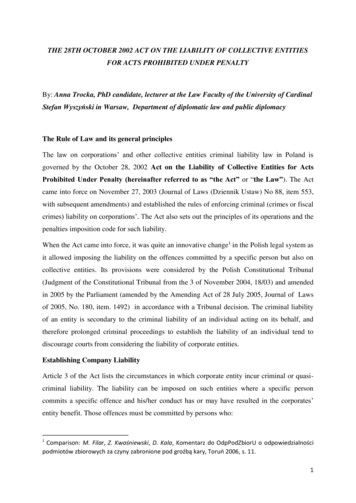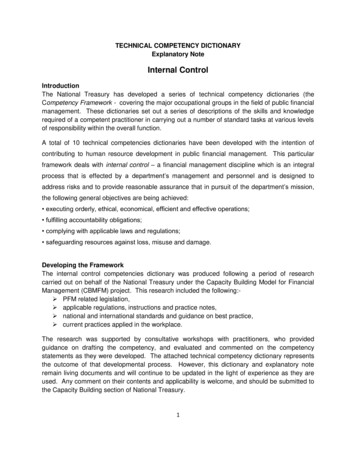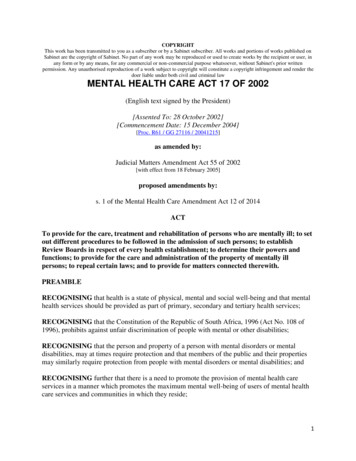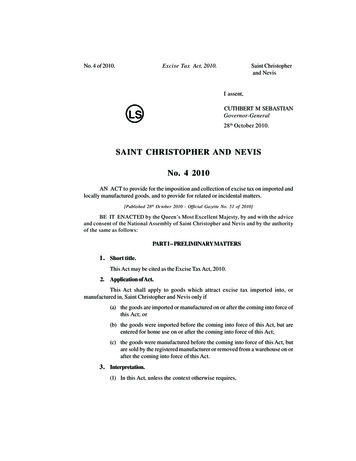
Transcription
THE 28TH OCTOBER 2002 ACT ON THE LIABILITY OF COLLECTIVE ENTITIESFOR ACTS PROHIBITED UNDER PENALTYBy: Anna Trocka, PhD candidate, lecturer at the Law Faculty of the University of CardinalStefan Wyszyński in Warsaw, Department of diplomatic law and public diplomacyThe Rule of Law and its general principlesThe law on corporations’ and other collective entities criminal liability law in Poland isgoverned by the October 28, 2002 Act on the Liability of Collective Entities for ActsProhibited Under Penalty (hereinafter referred to as “the Act” or “the Law”). The Actcame into force on November 27, 2003 (Journal of Laws (Dziennik Ustaw) No 88, item 553,with subsequent amendments) and established the rules of enforcing criminal (crimes or fiscalcrimes) liability on corporations’. The Act also sets out the principles of its operations and thepenalties imposition code for such liability.When the Act came into force, it was quite an innovative change1 in the Polish legal system asit allowed imposing the liability on the offences committed by a specific person but also oncollective entities. Its provisions were considered by the Polish Constitutional Tribunal(Judgment of the Constitutional Tribunal from the 3 of November 2004, 18/03) and amendedin 2005 by the Parliament (amended by the Amending Act of 28 July 2005, Journal of Lawsof 2005, No. 180, item. 1492) in accordance with a Tribunal decision. The criminal liabilityof an entity is secondary to the criminal liability of an individual acting on its behalf, andtherefore prolonged criminal proceedings to establish the liability of an individual tend todiscourage courts from considering the liability of corporate entities.Establishing Company LiabilityArticle 3 of the Act lists the circumstances in which corporate entity incur criminal or quasicriminal liability. The liability can be imposed on such entities where a specific personcommits a specific offence and his/her conduct has or may have resulted in the corporates’entity benefit. Those offences must be committed by persons who:1Comparison: M. Filar, Z. Kwaśniewski, D. Kala, Komentarz do OdpPodZbiorU o odpowiedzialnościpodmiotów zbiorowych za czyny zabronione pod groźbą kary, Toruo 2006, s. 11.1
(1) act in the name or the interest of the entity pursuant to authority or obligations torepresent it, undertaking in its name decisions or performing of internal reviews or byexceeding such authority or not fulfilling such obligation (art. 3 point 1 of the Law);(2) permitted to act as a result of exceeding authority or non-fulfillment of obligations bypersons described in point 1(art. 3 point 2 of the Law);(3) acting in the name or on behalf of the entity, with the consent or knowledge ofpersons described in point 1(art. 3 point 3 of the Law).Limitations on Corporate Liability(1) A collective entity is subject to corporate liability, only if a person as described in art.3 of the Law committed one of the crimes listed in Article 16 of the Law. The listincludes, inter alia, the crime as bribery and giving bribes defined in art. 229 of the(Polish) Penal Code2 (in Polish: Kodeks Karny) of 6 June 1997, published in Journal ofLaws (Dziennik Ustaw) No 88, item 553, with subsequent amendments.(2)As provided in art. 4 of the Law, a collective entity shall be liable if the fact ofperforming such forbidden act described in art. 16 of the Law, by a person described inart. 3 of the Law, has been confirmed by a final and enforceable court decision findingsuch person guilty, a court decision conditionally canceling criminal proceedings againstthem, a decision on granting such a person permission to submit to liability or a decisionof the court canceling further proceedings due to circumstances excluding punishment.2Art. 229 of the (Polish) Penal Code:§ 1. Any person who gives or promises to give a financial or personal advantage to any personperforming a public function in connection with performance of such a function shall be liable tothe penalty of imprisonment for a period not shorter than 6 months and not longer than 8 years.§ 2. In the case of a less serious crime, the perpetrator shall be liable to a fine, restriction of libertyor imprisonment for a period not longer than 2 years.§ 3. If the perpetrator of the prohibited act referred to in § 1 above acts so as to induce a personperforming a public function to violate legal regulations or gives or promises to give to such aperson a financial or personal advantage for violation of legal regulations, then the perpetratorshall be liable to the penalty of imprisonment for a period not shorter than 1 year and not longerthan 10 years.§ 4. Any person who gives or promises to give a financial benefit of significant value to a personperforming a public function in connection with the performance of the function shall be liable tothe penalty of imprisonment for a period not shorter than 2 years and not longer than 12 years.§ 5. Any person gives or promises to give a financial or personal advantage to a personperforming a function in a foreign country or in an international organisation in connection withthe performance of the function shall accordingly be liable to the penalties provided for under §§1 – 4 above.2
(3) A collective entity shall be liable if at least, in performing the forbidden act the lackof due diligence occurred in the choice of the physical person described in art. 3 points 2or 3 of the Law, or at least lack of adequate supervision over such persons on the part ofbodies or representatives of the collective entity.Corporate liability or lack of corporate liability of the collective entity pursuant to rulesestablished in the Law does not exclude civil liability for damage caused, administrativeliability or individual legal liability of the person performing such forbidden act.Liability of the collective entity for the actions of the individualsThe first substantive basis for liability of collective entities is to achieve the benefits (evennon-pecuniary benefit as well as even the possibility to achieve the benefits) as a result of acrime of a natural person acting on behalf or in the interest of the collective entities.Another basis is resulting from art. 5 of the Law, which is based on finding specific quasifault of the collective entity3. To pull the collective entity responsible for the act of theindividual, it must be stated (in accordance with Art. 5 of the Law):1) at least a lack of due diligence in the selection of a natural person referred to in art. 3point 2 or 3 of the Law or2) at least the lack of adequate supervision of that person.In the judgment form 11 April, 2013 (case citation: V KK 21/2013, Lexis) the Polish SupremeCourt (Criminal Division) clearly confirms that from the date of entry into force of the Lawthe possibility of pulling collective entities criminally liable for acts committed by membersof the management of these entities, including the president of the limited liability companyhas been eliminated. The Court stressed that:"provision of art. 5 of the Act of 28 October 2002 on the liability of collective entitiesfor acts prohibited under penalty (Journal of Laws of 2002 No. 197, item. 1661, asamended), as amended by the Amending Act of 28 July 2005 (Journal of Laws of 2005,No. 180, item. 1492) establish unequivocally the premise of the "fault" of the collectiveentity in relation to the persons mentioned in Art. 3, paragraphs 2 and 3 of this Act, by3Compare: T. Marzec, Odpowiedzialnośd podmiotów zbiorowych za czyny zabronione pod groźbą kary,wybrane zagadnienia, available ne-zagadnienia.html3
pointing to the "fault" in the selection or supervision. The omission in this provision ofprerequisite of the own responsibility of the collective for the acts of persons referred toin Art. 3 paragraph 1 and the lack of other rules concerning the liability of the entity forthe actions of its management, in the inability to hold a collective entity liable foroffenses of this category of persons."As regards the abovementioned prerequisite of the “fault” in the selection or supervision weare dealing with a well-known concept of the fault in civil law in the selection (culpa ineligendo), fault in supervision (culpa in custodiendo) and the so-called organisational fault4.For finding fault in the selection, or fault in supervision the court should take into account allthe circumstances surrounding the activities of the collective entity. In addition, the fault inthe supervision occurs only when the duty of supervision resulted from a specific source(laws, statutes, contracts). It should be noted, however, that the attempt to adapt solutions tocomplicated civil law basis for liability on the ground of a criminal nature, together with theambiguity of interpretation of certain terms can lead to numerous problems of proof inproceedings relating to collective entities.On the other hand, when the criminal liability of a manager, officer or director as determinedin a final court’s judgment in criminal proceedings against specific person this may result inthe criminal liability of an entity (if the other conditions for liability mentioned above arefulfilled). What should be stressed - at the same time, an entity's liability for an offence doesnot automatically determine the personal liability of its managers, officers or directors. On themargins of this considerations should be also pointed out that if a corporate entity is heldliable for a fiscal offence, the officers or directors thereof may be held accountable on thebasis of auxiliary liability. In order to incur such liability, it is sufficient that a director orofficer be negligent in fulfilling his/her duties.Offences falling within the Act (listed in Article 16)Those are offences against, inter alia:(1) Economic turnover,(2) Trading in money and securities,(3) The protection of information,4M. Filar, Z. Kwaśniewski, D. Kala, op. cit., s. 57.4
(4) The reliability of documents,(5) Property,(6) Environment,(7) Bribery, corruption,(8) Fiscal offences.ProcedureProceedings related to potential corporate liability are initiated on the motion of a prosecutoror harmed party. In such proceedings the burden of proof rests on the person who submitsevidence. The Management Board or the appropriately authorized body will represent theentity in liability proceedings. The entity can grant a power of attorney to a legal advisor oradvocate. Evidence can be admitted on the motion of a party, and in justified cases, suasponte; evidence that is obviously submitted in order to extend the procedure is notadmissible. The Court shall individually make factual and legal decisions as limited by themotion; decisions which are described in art. 4 of the Law shall, however, be binding. Boththe entity and the motioning party have a right to appeal for the decision of the court of firstinstance.Nature of the liabilityCurrently, when it comes to the nature of the liability established in the discussed Law it shallbe regarded in the light of the art. 5 of the Framework Decision 2003/568/JHA of 22 July2003 on combating corruption in the private sector. According to this provision the EUMember States shall implement liability provisions for legal entities. Wording of theprovision leaves the nature of the liability – criminal, administrative or civil – up to thediscretion of the States. The comparative overview shows a great diversity of the solutionapplied in national legislation5.5Rafał Kierzynka, Liability of legal persons in Poland - Legal framework, its advantages, shortcomingsand auxiliary institutions - Confiscation of assets as the way of counteraction and fighting the corporate y%20of%20legal%20persons%20in%20Poland.pdf5
The solution applied in Polish legal system meets the EU requirements however it has specificfeatures. As R. Kierzynka stressed, the nature of the liability is in Poland peculiar: quasicriminal liability, nor civil, nor administrative, neither penal6.The liability however is linked to criminal proceedings are clear: the action is taken by theprosecutor and the sanctions have repressive nature and the collective entity can participate inthe criminal proceedings against the natural person.Despite the similarities the liability of legal persons cannot be named strictly “criminal”, dueto the principle of polish criminal law that only the natural person can be held criminallyliable.Penalties available under the LawUnder the Law there are foreseen the following penalties:1. Vis-à-vis the collective entity, the Court shall impose a fine in amounts from 1,000 to20,000,000 PLN, no higher, however, than 10% of the income achieved in the fiscalyear in which the forbidden act constituting the basis for liability of the collectiveentity, was performed.2. Furthermore, decisions on forfeiture of objects of economic benefit shall be renderedvis-à-vis collective entities of:a. objects resulting, even indirectly, from forbidden acts or which served or weredesignated for performance of forbidden acts;b. economic benefits resulting, even indirectly, from a forbidden act;c. the equivalent value of objects or material benefits resulting, even indirectlyfrom forbidden acts,- unless the given object, economic benefit or its equivalent is to be returned toanother authorized entity.3. Furthermore, generally vis-à-vis collective entities, decisions can be rendered:6Ibidem.6
a. prohibiting the promotion or advertisement of commercial activities, productionor sale of goods, performed services or consideration tendered;b. prohibiting the use of subsidies, benefits, or other form of financial supportfrom public sources;c. prohibiting the use of international organizational aid, in which the Republic ofPoland is a member;d. forbidding participation in public tenders;e. forbidding conduct of certain basic or other activities;f. submitting of a decision to public record.The Court orders described in points a-e above are made for periods of one to five years.The Law provides guidelines which the Court should follow in adjudicating a fine,prohibition, or submitting a decision to public record (art. 8 par. 2, art. 9 par. 3, art. 10-14of the Law).The conclusionsThe level of enforcement of this regulation is low and it has rarely been used in practicetaking into account the number of the indictments and the casesAccording to statistics published by the Polish Ministry of Justice and the General PublicProsecutor's Office, from 2005 to 2010 only 104 corporate entities were prosecuted under theLiability Act, and fines (the highest of which was PLN 12,000 – approx. EUR 3,000) wereimposed on only 31 of them7. Furthermore, in only seven cases were the judgmentspublicized. However, because of the tendency in Poland towards the creation of strictercriminal law, it is probable that provisions of the Liability Act will be used more frequently infuture. Those statistics clearly show that instead of using the tools established in the Law,Polish authorities use existing mechanisms, as civil confiscation or tax confiscation, which aredeeply-rooted in Polish tradition and legal consciousness. It may prove that sometimes it ismore reasonable to use existing systems then introduce new ml7
8
the possibility of pulling collective entities criminally liable for acts committed by members of the management of these entities, including the president of the limited liability company has been eliminated. The Court stressed that: "provision of art. 5 of the Act of 28 October 2002 on the liability of collective entities





![Immigration Act [No. 13 of 2002] - Gov](/img/30/a13-020.jpg)
![Financial Advisory and Intermediary Services Act [No. 37 of 2002]](/img/30/a37-020.jpg)



